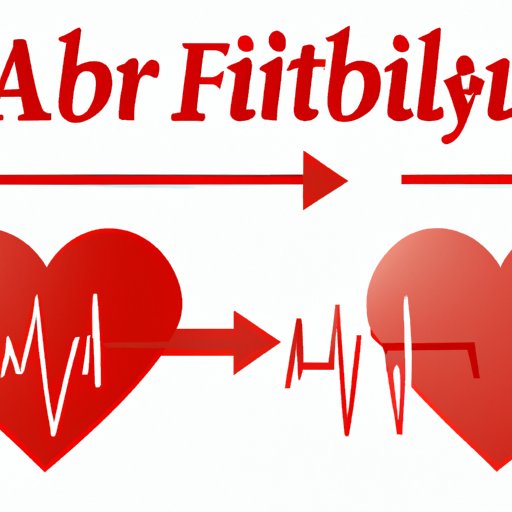
Introduction
Atrial Fibrillation or Afib is a condition where the heart beats irregularly, leading to an increased risk of blood clots, stroke, and heart failure. It affects around 33 million people worldwide, and its prevalence is expected to increase with the aging population.
In this article, we’ll explore the relationship between Afib and heart health, highlighting its potential impact on overall cardiovascular health and necessary steps to prevent or manage the condition.

The Connection between Atrial Fibrillation and Heart Disease: What You Need to Know
Heart disease is an umbrella term used to describe various cardiovascular conditions that affect the heart’s structure and function. These conditions range from coronary artery disease, heart attack, heart failure, and arrhythmia, among others.
Afib is a type of arrhythmia, which means it affects the heart’s rhythm, leading to an irregular heartbeat. The irregular heartbeat caused by Afib can have significant effects on heart health, leading to an increased risk of blood clots, stroke, and heart failure.
Research has shown that patients with Afib have a higher risk of developing other types of heart disease, such as coronary artery disease, heart failure, and valve disease.
Is Atrial Fibrillation a Type of Heart Disease? Understanding the Link
Yes, Afib is considered a type of heart disease. As mentioned earlier, Afib affects the heart’s rhythm, leading to an irregular heartbeat. This irregular heartbeat can have significant effects on heart health, leading to an increased risk of other cardiovascular diseases.
Other types of heart disease include coronary artery disease, heart attack, heart valve disease, heart failure, and others. These cardiovascular conditions can affect the heart’s structure, function, and blood vessels, leading to a significant impact on overall cardiovascular health.
Diagnosis of Afib involves various tests, including electrocardiogram (ECG), echocardiogram, and Holter monitoring, among others. These tests help in evaluating the heart’s electrical and structural activity, identifying issues that may affect its function.
Exploring the Relationship between Heart Disease and Atrial Fibrillation
Research has shown that Afib is prevalent among patients with other types of heart disease. For example, around 33% of patients with heart failure have Afib, and 10% of heart attack patients are affected by the condition.
Heart disease can also affect the frequency and severity of Afib episodes. Patients with heart disease are more likely to experience frequent and severe Afib episodes, leading to an increased risk of complications, such as blood clots and stroke.
Additionally, some types of heart disease, such as coronary artery disease, can damage the heart’s tissues, leading to an increased risk of developing Afib.
The Impact of Atrial Fibrillation on Overall Heart Health
Afib can have significant effects on overall cardiovascular health. Research has suggested that patients with Afib have a higher risk of developing other types of cardiovascular diseases, such as heart failure, coronary artery disease, and valve disease.
Additionally, the irregular heartbeat caused by Afib can lead to an increased risk of blood clots and stroke. These complications can have a severe impact on overall health and quality of life and may even be life-threatening.
Proper diagnosis and treatment of Afib are essential to manage the condition’s potential impact on overall cardiovascular health.
Understanding the Symptoms and Risk Factors of Afib as a Type of Heart Disease
Patients with Afib may experience various symptoms, including palpitations, shortness of breath, fatigue, and dizziness. These symptoms can be mild or severe, depending on the frequency and severity of Afib episodes.
Several risk factors are associated with the development of Afib, including age, high blood pressure, diabetes, obesity, and a history of heart disease or stroke. Additionally, lifestyle factors, such as smoking and excessive alcohol intake, can increase the risk of developing Afib.
Early detection and treatment of Afib are essential to prevent potential health complications and improve overall heart health.
What You Need to Know about Afib and Its Potential Impact on Your Cardiovascular Health
Being aware of your heart’s health is essential to prevent and manage Afib. Patients with a history of heart disease or other cardiovascular conditions may be at a higher risk of developing Afib and should be vigilant of its symptoms.
Proper management of Afib involves various lifestyle changes, including dietary modifications, exercise, stress reduction, and smoking cessation. Additionally, medications, such as anti-arrhythmia drugs and blood thinners, may be prescribed to manage Afib episodes and reduce the risk of complications.
The impact of proper management of Afib on overall cardiovascular health cannot be overstated. The condition’s potential effects on heart health and overall quality of life make it a crucial area of focus for patients and healthcare professionals alike.
The Role of Lifestyle Changes in Preventing or Managing Afib as a Form of Heart Disease
Maintaining a healthy lifestyle is essential to prevent and manage Afib as a form of heart disease. Dietary changes, such as reducing sodium intake and increasing fiber consumption, can help manage blood pressure and maintain a healthy weight.
Regular exercise and stress management techniques, such as yoga and meditation, can help improve heart health and reduce the risk of developing Afib. Smoking cessation is also crucial as smoking has been linked to an increased risk of Afib.
Conclusion
Overall, Afib is considered a type of heart disease that can have significant effects on overall cardiovascular health. Proper diagnosis and treatment of Afib, along with necessary lifestyle modifications, are crucial to prevent potential complications and improve heart health.
We encourage readers to prioritize their cardiovascular health by maintaining a healthy lifestyle and working with their healthcare professionals to manage and prevent Afib.





